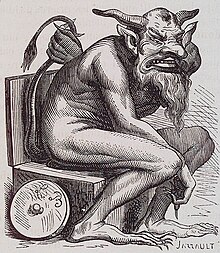Belphegor
This article needs additional citations for verification. (January 2011) |

In demonology, Belphegor (or Beelphegor, Hebrew: בַּעַל-פְּעוֹר baʿal-pəʿōr) is a demon, and one of the seven princes of Hell, who helps people make discoveries. He seduces people by suggesting to them ingenious inventions that will make them rich. According to some 16th-century demonologists, his power is stronger in April. Bishop and witch-hunter Peter Binsfeld believed that Belphegor tempts by means of laziness.[1] Also, according to Peter Binsfeld's Binsfeld's Classification of Demons, Belphegor is the chief demon of the deadly sin known as Sloth in Christian tradition.[2]
Belphegor originated as the Assyrian Baal-Peor, the Moabitish god to whom the Israelites became attached in Shittim (Numbers 25:3), which was associated with licentiousness and orgies. It was worshipped in the form of a phallus. As a demon, he is described in Kabbalistic writings as the "disputer", an enemy of the sixth Sephiroth "beauty". When summoned, he can grant riches, the power of discovery and ingenious invention. His role as a demon was to sow discord among men and seduce them to evil through the apportionment of wealth.[citation needed]
According to De Plancy's Dictionnaire Infernal, he was Hell's ambassador to France. Belphegor also figures in Milton's Paradise Lost and in Victor Hugo's The Toilers of the Sea.[citation needed]
Popular culture
This section may contain information not important or relevant to the article's subject. (February 2010) |
- Belphegor is the name of a blackened death metal band from Salzburg, Austria. The band also has an eponymous song: Belphegor - Hell's Ambassador, which describes the role of the demon Belphegor as a bringer of ingenious inventions.
- Belfagor arcidiavolo aka Il demonio che prese moglie is a short story written in 16th century by Niccolò Machiavelli.
- Belphégor is a 1927 horror novel by Arthur Bernède.
- In the webcomic Megatokyo, Belphegor is a cat who works for the main character's "anti-conscience".[3]
- Belphegor appears as a recurring demon in the Shin Megami Tensei series of occult-themed RPGs. The demon is depicted as a purple skinned demon sitting on a toilet.
- In Dominions 3: The Awakening, he is a demon lord associated with seducing people to evil.
- In the game Heroes of Newerth, Balphagore is a playable hero.
- In RF Online, Belphegor is a boss monster living inside a volcano at Volcano Cauldron.
- Belphégor, a film made in 1927 and directed by Henri Desfontaines.
- Belphegor, Phantom of the Louvre in 2001.
- Belphegor is the name of a character from the 2004 manga series Katekyo Hitman Reborn!.
- Belphemon is a character in the Digimon franchise based on Belphegor
- Ottorino Respighi's opera of 1923 is called Belfagor.
- Belphegor is one of the Seven Sisters of Purgatory in the murder mystery visual novel Umineko no Naku Koro Ni.
- Belphegor is one of the Seven Powerful Flames from Hell in the sci-fi visual novel Code:Breaker.
- The official English title to the Vocaloid song Gift from the Princess who Brought Sleep, featuring Hatsune Miku, is called "Belphegor's Gift". The song is part of a series inspired by the seven sins.
- In the final episode of season 2 of Kore wa Zombie Desu ka?, the cast venture into the mind of Ayumu Aikawa, the main character. There they combat his personified emotions, which have demonic names corresponding to the sinful emotion they represent. Belphegor is the final and most powerful of these personifications, as Ayumu yearned for a simple, safe, slothful existence before the supporting cast introduced such chaos and activity into his life.
- A Digimon named Belphemon is based off of Belphegor. It first appears as one of the antagonists of Digimon Data Squad. In other media, it is a member of the Seven Great Demon Lords.
- In the light novel series Ore no Imouto ga Konna ni Kawaii Wake ga Nai, main character Kyousuke Kousaka's childhood friend Manami is nicknamed Belphegor by his little sister's friend, after a manga interpretation of the demon as a voluptuous seductress.
References
- ^ Wendy Doniger (1999). Merriam-Webster's Encyclopedia of World Religions. ISBN 0-87779-044-2.
- ^ Encyclopedia of Demons and Demonology, By Rosemary Guiley, p. 28-29, Facts on File, 2009.
- ^ Gallagher, Fred (2003-06-16). "the helpless, damaged victim look". Megatokyo.
